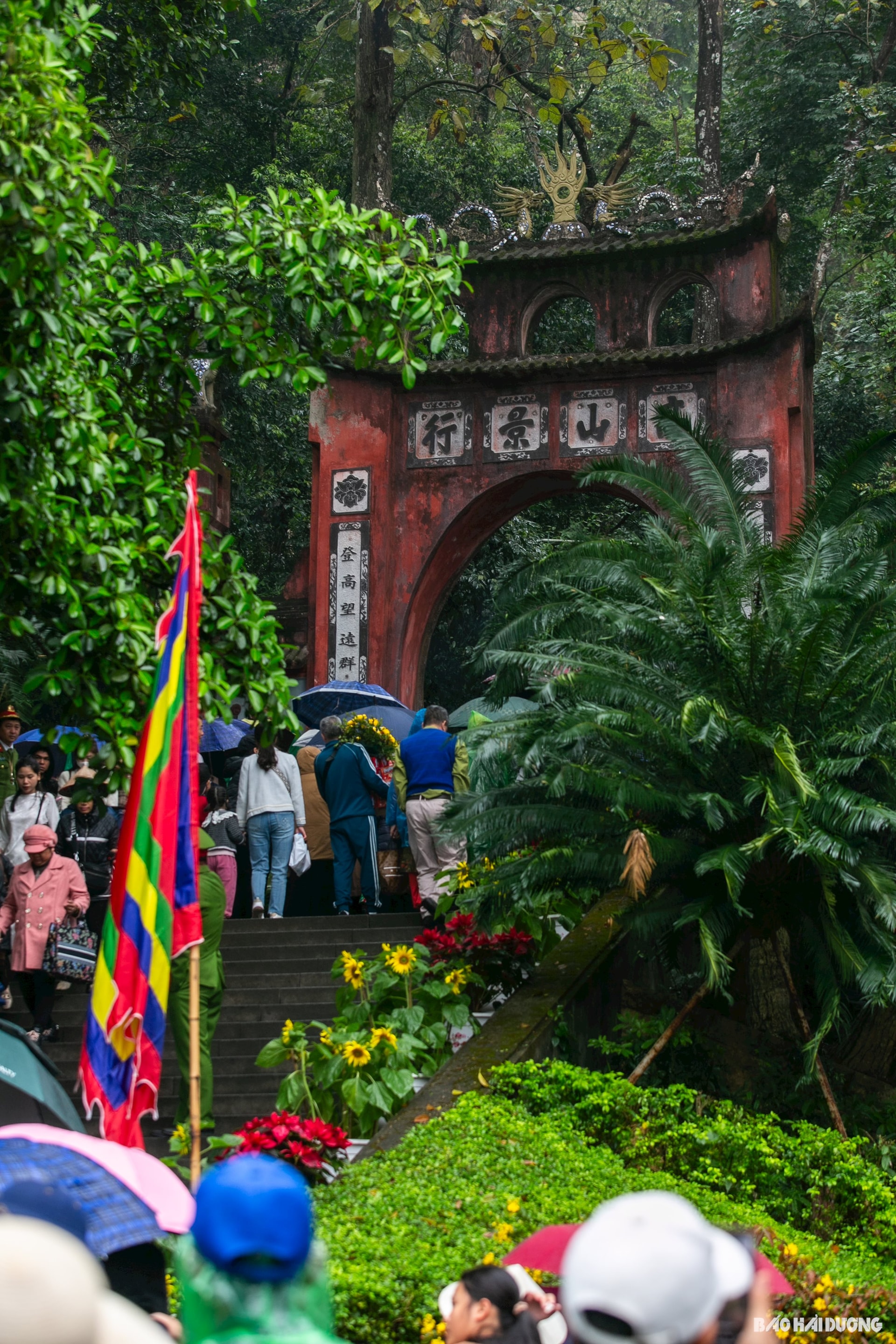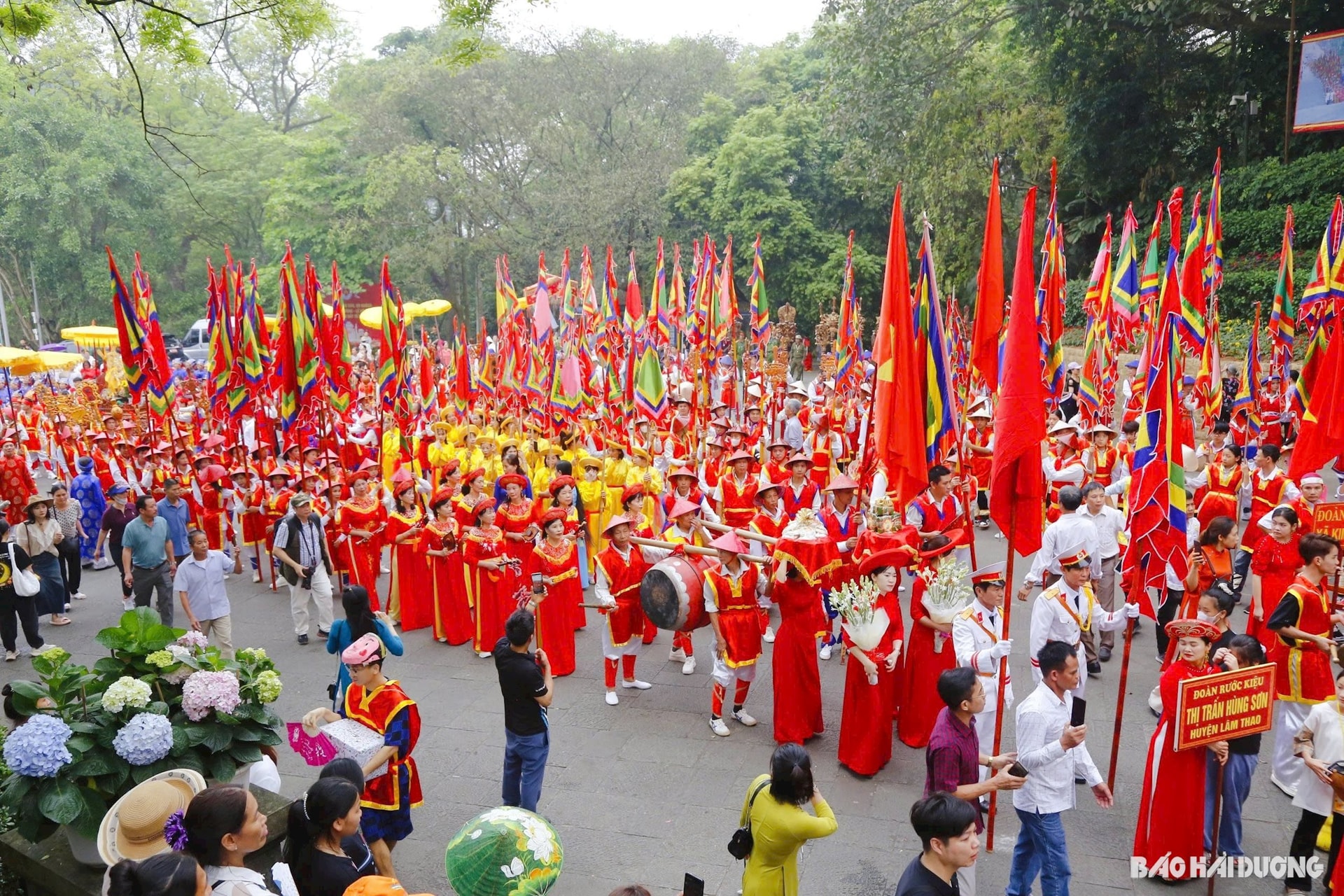Spanning thousands of years of history, the Hung Temple Festival has had a strong vitality and spread strongly. From a village festival to a national festival, it is being preserved and passed down by generations of Vietnamese people.

National beliefs
The history of the Vietnamese nation began with the Hung King era with the merits of the Hung Kings who founded the country, broke rocks, expanded, and built the Van Lang State. Remembering that great merit, generations of Vietnamese people have honored the Hung Kings as the ancestors of the nation for thousands of years. The worship of the Hung Kings has become a custom, a belief and has been passed down from generation to generation. Throughout history, this belief has become a spiritual support, a belief in the sacred and mysterious power of ancestors for the Vietnamese people to strengthen the great solidarity, join hands to defeat natural disasters, foreign invaders, and protect the country's borders.
Studies have shown that thousands of years ago, our ancestors built Hung Temple and organized the Hung Temple Commemoration with a folk character. Treo village, Hy Cuong commune and Vi village, Chu Hoa commune (both in Viet Tri city) joined hands to build Hung Temple with the initial scale of only a small temple. He village festival (the old common name of Vi and Treo villages) with many ancient folk performances was organized: Howling procession, running from the enemy, showing elephants and horses, welcoming princesses, performing humorous plays. When the Trung sisters raised the flag of uprising to drive out the Eastern Han invaders, they went to the Upper Temple in the Hung Temple relic site to worship heaven and earth, vowing to avenge their family and repay their country's debt, and succeeding the Hung Kings.
"Thien Nam Ngu Luc" recorded Trung Trac's oath as follows: "First, I wish to wash away the country of hatred/ Second, I wish to restore the old career of the Hung family...". In 980, when the country gained independence, King Dinh Tien Hoang officially ordered the writing of the sacred story. During the following feudal dynasties, Hung Temple was renovated and built to become more spacious and majestic.
The ancient books “Dai Viet Su Luoc” and “Dai Viet Su Ky Toan Thu” have affirmed and explained the common origin and source of the Vietnamese people - the Hung Kings. In the first year of Hong Duc, the Later Le Dynasty compiled “Ngoc Pha Hung Vuong” which stated: “From the Dinh, Le, Ly, Tran dynasties to our current dynasty, Hong Duc Later Le, people still burn incense in the temple in Trung Nghia village (Co Tich), where people from all over the country come to worship to commemorate the merits of the ancient Holy Ancestor”.
During the Nguyen Dynasty, the capital was located in Hue (in 1823). King Minh Mang had the Hung Kings' tablets brought to the Lich Dai De Vuong Temple to be worshiped, and the Hung Temple was granted a title for worship. The ceremony to celebrate the Hung Kings' death anniversary was specifically and strictly regulated, showing the respect of the dynasties and people for their ancestors.
The August Revolution of 1945 succeeded, the country gained independence, the Party, the State and our people paid special attention to the worship of the Hung Kings - the common ancestors of the nation and focused on investing funds to renovate and embellish the Hung Temple historical relic to become more spacious, worthy of being a place to worship the common ancestors of the nation.
Immediately after the founding of the Democratic Republic of Vietnam, on February 18, 1946, President Ho Chi Minh issued Decree No. 22C NV/CC regulating major annual holidays, including the Hung King's Commemoration Day as a one-day holiday.
On April 2, 2007, the National Assembly approved amendments and supplements to Article 73 of the Labor Code allowing employees to take time off with full pay on the Hung Kings' Commemoration Day, the 10th day of the third lunar month.
In 2010, the Hung Kings' Commemoration Day - Hung Temple Festival was held for the first time in the most solemn national ceremony in history, with President Nguyen Minh Triet presiding over the incense offering ceremony and conducting solemn rituals and ceremonies to commemorate the Hung Kings. This event marked the peak of development, demonstrating the strong vitality and spread of the festival over time and space. The scale of the festival demonstrates the spirit of national convergence, solidarity and preservation of Vietnamese cultural identity towards the nation's roots - a particularly important tradition expressed through the Hung Temple Festival in many different periods. At the same time, it clearly demonstrates the spiritual character of the Vietnamese people in history - past - present - future.

Preserve and develop
Proud to be the "firstborn son", the place where the King chose to build the capital, for many years, Phu Tho province has always made efforts to mobilize all resources to restore and build Hung Temple worthy of the status of a special national relic site, organizing the Hung Temple Festival as an exemplary festival in the whole country, a place where the quintessence of national culture converges and shines, a beautiful symbol of spiritual and cultural values, fully demonstrating the intelligence, morality, character, bravery, and noble soul of the Vietnamese people...
The everlasting vitality, movement, development and strong spread of the Hung Kings' Commemoration Day - Hung Temple Festival originates from the value and nature of the morality of "gratitude", in which filial piety is the core. The journey of expressing filial piety has overcome many ups and downs of time, has settled and crystallized in each cultural layer - in the beginning, it was the worship of the Mountain Gods, River Gods, Rice Gods... then it transformed into ancestor worship. In the beginning, it was the custom of worshiping gods on Nghia Linh Mountain, then the construction of temples, pagodas, worshipping, and organizing the commemoration ceremony, which at first was just a village festival and gradually transformed into a national festival and a national festival with the solidarity of the entire ethnic community.
According to statistics from the Ministry of Culture, Sports and Tourism, the whole country has 1,417 relics worshiping Hung Kings and figures of the Hung King era, in Phu Tho province alone there are 345 relics associated with villages worshiping Hung Kings, of which the Hung Temple National Special Historical Relic Site is the largest center for practicing Hung King worship in the country. The relics worshiping Hung Kings along with rituals and festivals are spread across the three regions of the North, Central and South.
Together with the whole country, to show gratitude to our ancestors and the Hung Kings, on the 10th day of the third lunar month every year, our overseas Vietnamese celebrate the Hung Kings' death anniversary, set up altars to worship the Hung Kings at the embassies and consulates of various countries to meet the need to turn to our ancestors and the nation.
In the US, our overseas Vietnamese mobilized donations to build the Hung King Temple named “Quoc To Vong Tu”, inaugurated in 2003 in San Jose City, California. The strong spread and vitality of the Hung King Worship and Ancestor Worship clearly demonstrated the traditional moral values of the Vietnamese people preserved and passed down from generation to generation.
With those unique values, on December 6, 2012, UNESCO officially recognized the Hung King Worship in Phu Tho as a representative intangible cultural heritage of humanity.
NGUYEN DAC THUY, Director of Department of Culture, Sports and Tourism of Phu Tho